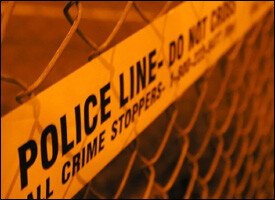
Murder Rate Among Highest In World
Bassetere – Nevis
September 01, 2011 (CUOPM)
With a call for support from the community in the Federation of St. Kitts and Nevis, the new Commissioner of Police, Mr. Calvin G. Walwyn pledged to embark on a progressive and proactive path to reducing crime and violence.
“The Royal St. Christopher and Nevis Police Force will make a difference in crime reduction in the Federation. The citizens can be assured that all police officers in this Federation, starting in my office, will be held accountable for their actions,” said Walwyn, during remarks at a ceremony marking the passing of the Commissioner’s Baton at the Warner Park Cricket Stadium.
“As we embark on a mission to make St. Kitts and Nevis a safer place for both residents and visitors alike, I am reminded that while persons can be trained as managers, leaders must have the innate or in-born ability to lead,” said Walwyn, who in his academic pursuits has attained a Bachelors of Science degree in Criminal Justice, a Masters Degree in Homeland Security, and have completed and passed his final examinations for a Ph.D in Public Safety with a concentration on Leadership.
“Not only do I have the academic background to lead this agency, I also have the administrative capacity to lead having served as a Texas police chief and Director of Surveillance of an international investigation company,” Walwyn told a wide cross section of the community that included Governor General, His Excellency Dr. Sir Cuthbert Sebastian; Deputy Governor General of Nevis, Mr. Eustace John and Mrs. John; Prime Minister Hon. Dr. Denzil L. Douglas; Deputy Prime Minister Hon. Sam Condor and Mrs. Condor; Premier of Nevis, Hon. Joseph Parry; Ministers of the Federal Government and the Nevis Island Administration; Speaker of the national assembly and Members of the National Assembly and the Diplomatic and Consular Corps and the High Command and Officers of the Royal St. Christopher and Nevis Police Force.
Mr. Walwyn said he has learned that leaders must have the ability to recognize their own strengths and weakness.
“What’s more, they must have the ability to recognize the strengths and weakness of their subordinates. This is why institutional professionalism is only as good as the ethics and integrity of the supervisor who claim them. Therefore it would be impossible for leaders to expect subordinates to behave ethically, or for supervisors to demand integrity from their officers when said supervisors violate department policy, reveal sensitive information, and use the police force resources to pursue private interests,” he said, adding:
“Leaders must be dedicated and committed to the philosophies of the organization and to operate within the established laws and codes of behaviour expected of them. Similarly, the primary obligation of leadership, especially among law enforcement agencies, is the creation of a civil and morally enabling work environment that is conducive to maximum productivity. The more aggressively a leadership group can move to establish such an environment, the easier and the faster the goals of ethical work place environment can be achieved. Professionalism will reign and corruption and other vices will be stamped out. Furthermore, it has been stated that good leaders should be able to avoid the possibility of organizational politics developing to a level that impedes the functionality and success of the environment.”
“As a police officer who has worked the streets in two states, I know that there are sometimes overzealous officers who at times can step out of bounds in the performance of their duties. But I also know that there are officers who go out of their way to help citizens they come in contact with. I have heard a lot about the first group of officers, I would also like to hear about the second group of officers. I will build on the policy that investigates complaints against police officers, but I will also like to commend those officers who go beyond the call of duty in serving the public. I realize that not all persons might share this sentiment, but I believe in acknowledging those officers who have done their best to make St. Kitts and Nevis a better and safer place to live,” he said.